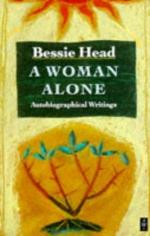
|
| Name: _________________________ | Period: ___________________ |
This test consists of 15 multiple choice questions and 5 short answer questions.
Multiple Choice Questions
1. In old African custom, what were women forbidden to handle?
(a) Goats.
(b) Cattle.
(c) Ivory.
(d) Silk.
2. In "Despite broken bondage . . .," what does Bessie say the emancipation of women in Botswana was rooted in?
(a) The historical role of Christianity.
(b) Passion.
(c) Necessity.
(d) Determination.
3. In Chapter2, how does Bessie describe her third novel, "A Question of Power"?
(a) Intensely personal and private.
(b) The most satisfying.
(c) A work of excruciating detail.
(d) Difficult to write.
4. When did Bessie first get published?
(a) 1969.
(b) 1967.
(c) 1966.
(d) 1968.
5. In "African religions," why did Bessie say that most of Asia was blanked out as barbaric in her school's geography book?
(a) They were difficult to convert to Christianity.
(b) They were not considered civilized.
(c) Asia was mostly unknown, back then.
(d) They were not democratic.
6. In "African religions," what does African religion focus on?
(a) Deities.
(b) Afterlife.
(c) Mutual cooperation.
(d) Sacrifice.
7. What is a "bogadi," in African culture?
(a) Type of bread.
(b) Religious statue.
(c) Village square.
(d) Bride price.
8. In Chapter 2, what does Bessie say is the root of traditional African life?
(a) The land.
(b) Work, rest and prayer.
(c) Respecting your neighbor.
(d) Being at one with all things.
9. Josef Herman, the artist who lived through the Nazi invasion of Poland, fled to what country?
(a) England.
(b) Spain.
(c) Ireland.
(d) United States.
10. In Chapter 2, whose religious ideas hold great appeal for Bessie?
(a) The Pope.
(b) The local bishop.
(c) Professor Mbiti.
(d) Buddah.
11. In Chapter 2, what does Bessie believe that people cannot protest against?
(a) Their own natures.
(b) The white man.
(c) Religion.
(d) Evil social systems.
12. What did Bessie feel defeated her in South Africa as a writer?
(a) Religion.
(b) Anger.
(c) Mental illness.
(d) The environment.
13. What is the only industry that the British used Botswana for?
(a) Timber production.
(b) Farming.
(c) Mining.
(d) Railroad.
14. Bessie states that one day all nations shall dwell under what shadow?
(a) Global civilization.
(b) Peace.
(c) The Pharaoh's.
(d) Total equality.
15. In Chapter 2, Bessie believes that God is embodied in whom?
(a) Her adoptive mother.
(b) The children.
(c) The souls of all black Africans.
(d) The American woman.
Short Answer Questions
1. Who is the main character in Bessie's first novel, "When Rain Clouds Gather"?
2. How did the British refer to Botswana in the early 1800's?
3. In African culture, what can't a woman do to their husband?
4. What people did the Bushmen resemble?
5. Which of Bessie's novels is the only one that truly reflects a black South African viewpoint?
|
This section contains 424 words (approx. 2 pages at 300 words per page) |

|




